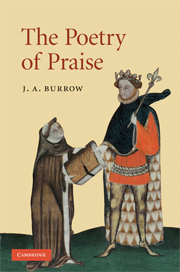Book contents
Chapter 5 - The decline of praise: two modern instances
Published online by Cambridge University Press: 22 September 2009
Summary
The ‘decline of praise’ in English poetry does not by any means date back as far as the end of the period with which this study has been concerned. On the contrary, it was during the following, Early Modern, period that the poetry of praise was to have its greatest age. Tudor and Stuart poets produced a wealth and variety of encomiastic writing unmatched by the surviving works of their English predecessors, and it is only in the course of the seventeenth century that the impulses can be seen to weaken. This flourishing of laus in Early Modern times has attracted the attention of many scholars, and I can do little more in this chapter than refer the reader to some of their studies. Of these, the most wide-ranging known to me is a book by O. B. Hardison entitled The Enduring Monument: A Study of the Idea of Praise in Renaissance Literary Theory and Practice (Westport, Conn., 1962). As well as giving a valuable account of the ‘theory of praise’ as it was received by poets in the sixteenth century, Hardison surveys the main encomiastic genres in the English verse of the time: epic (including Spenser's Faerie Queene), lyric (love poetry, hymns) and occasional poetry (especially elegy, to which he devotes three chapters). Other books address the subject of praise in particular writings, such as The Faerie Queene and Donne's Anniversaries.
- Type
- Chapter
- Information
- The Poetry of Praise , pp. 150 - 172Publisher: Cambridge University PressPrint publication year: 2008



